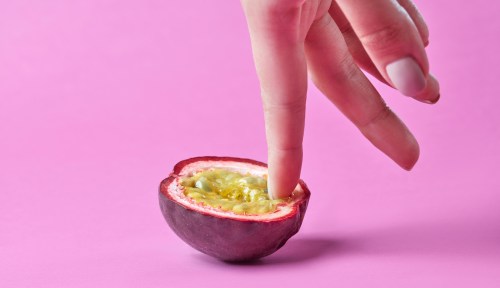Our editors independently select these products. Making a purchase through our links may earn Well+Good a commission
Can You Get a UTI From Masturbating?
Learn to separate the myths and realities about UTIs and masturbation, with the help of sexual health experts.

Masturbation is an accessible and healthy method of self-care, and as the importance of sexual wellness is becoming more widely recognized, it’s only becoming more accepted. Even as the conversation about self-pleasure expands, people are going to have masturbation-related queries—especially with all the myths about masturbation out in the world. Whether you’re masturbating with fingers or a vibrator, you may find yourself wondering: can you get a urinary tract infection (UTI) from masturbating? According to gynecologists, it’s not really possible to get a UTI exclusively from your vibrator but masturbating and sex can certainly play a role.
Experts in This Article
board-certified OB/GYN and chief medical director at Bonafide Health
board-certified OB/GYN, reproductive endocrinologist, and infertility specialist
board-certified gynecologist and medical director at VSPOT Medi Spa
Before we get into the connection between UTIs and masturbation, it’s important to know a bit about the condition first. UTIs are infections that happen when bacteria enters parts of the urinary system. “These are most commonly bacteria that can affect any part of the urinary system which can include the kidneys, ureters, bladder, or urethra,” says double-board-certified gynecologist Monica Grover, DO, medical director at VSPOT medi spa.
According to the Mayo Clinic, E. coli is the most common UTI-causing bacteria; it’s naturally in your anus and intestines. UTIs are not contagious, and can’t be passed from person to person during intercourse. Read on to learn all about the connection between masturbation and UTIs.
How common are UTIs?
Due to the unique anatomy of the female urethra, women, or people assigned female at birth, are more prone to UTIs than men—in fact, between 50 and 60 percent of American women will have at least one UTI in their lifetime and some women even have chronic or recurrent UTIs.
According to Lucky Sekhon, MD, a fertility specialist and board certified OB/GYN, “the female urethra—the passageway that connects the bladder to the outside world and allows for evacuation of urine when you use the bathroom—is short, relative to male anatomy, [so] this means that bacteria from the skin surrounding the urethra and the outside environment, in general, has a shorter distance to travel to get into the bladder and cause infection.”
The connection between masturbation and UTIs
There are many known benefits of masturbating, like better sleep and lower stress, and doing it doesn’t increase your risk of getting a UTI on its own. However, many of the actions that are part of sex and masturbation could contribute to UTIs by introducing bacteria that doesn’t belong into the urethra. “While masturbation itself does not increase the risk of UTIs, certain types of products associated with it such as lubrication or toys can,” says Dr. Grover.
“While masturbation itself does not increase the risk of UTIs, certain types of products associated with it such as lubrication or toys can.”—Monica Grover, DO, gynecologist
For example, she says that lubes can mess with the pH of the urogenital flora, or the naturally-occurring bacteria in the vagina, which can cause infections. Additionally, using toys in the anus in the vagina or anal fingering without proper cleanup can “cross-contaminate the urethra with bacteria that is innate to the anorectal region,” she says. (This is also why people are taught to wipe front to back when using the bathroom.)
You could also introduce bacteria into the urethra through poor masturbation hygiene, like using unclean fingers or sex toys, like dildos or vibrators—which is why it’s so important to never use anal toys in the vagina, and wash your hands when moving between the front and back door, and to regularly clean your sex toys. “Bacteria from the anus, as well as from fingernails, or the toys themselves can cause a cross-contamination that can infect the urethra with foreign pathogens,” adds Dr. Grover.
You could even get a UTI from friction during sex because the thrusting can push bacteria towards the urethra. “Keep in mind that during intercourse, thrusting, or manual stimulation, bacteria like E. coli that normally reside near the anal and vaginal openings can migrate toward the urethra,” gynecologist Alyssa Dweck, MD, OB/GYN previously told Well+Good. Peeing after sex may help flush out any bacteria so it can’t reach the urethra.
Any penetration—whether with a toy, penis, or fingers—can push bacteria closer to the urethra. Dr. Grover says “it’s actually common to get a urinary tract infection while being fingered during sexual activity as well as using toys or a vibrator.”
“When having sex or even when masturbating or using sex toys, there could be transfer of fecal matter residue and associated bacteria frontwards, near the urethra,” says Dr. Sekhon. “Therefore, it is possible that any of these acts could increase the risk of UTI, particularly in women who have other risk factors for developing a UTI.”
If you already have a UTI, masturbating can actually make it worse, too. Dr. Grover says masturbating can actually amplify the painful sensations of having a UTI by applying unneeded friction and pressure to already inflamed and irritated areas—so if you have a UTI, it’s best to cool it until you’re healed or try out masturbating without touching.
Common causes of UTIs
Beyond sex, there are many possible causes of UTIs. These include high sugar intake, not drinking enough water, poor hygiene that encourages spread of bacteria, holding in urine for extended periods of time, certain medications, surgical procedures, birth control, and menopause, says Dr. Grover. You could even get a UTI from peeing in a lake or other body of water.
Additionally, Dr. Sekhon says existing medical conditions like diabetes or even pregnancy can put people more at risk for getting a UTI because they can “make someone’s immune system less able to fight off infections.”
Symptoms of UTIs
How can you tell if you have a UTI? According to Dr. Grover, some of the hallmark symptoms of UTIs include:
- A strong need to pee often, even if you’ve gone recently
- Burning sensation while peeing
- Urine smells strong
- Urine looks cloudy or even bloody
- Pelvic pain
She says symptoms from UTIs after sex typically present within 48 hours. If you’re experiencing any of these symptoms, it’s best to seek treatment right away for your comfort and safety. Symptoms for advanced UTIs, which are infections that have gone untreated for longer, can include “fever, chills, or even altered mental status,” says Dr. Grover.
Treatments and relief for UTIs
If you find yourself experiencing pain or discomfort after masturbating or having sex, it’s worth checking in with your doctor. Some UTIs clear up on their own without the need for further treatment, says Dr. Grover, but many UTIs require treatment with antibiotics—in any case, it’s important to see a doctor for guidance.
There are some ways to find some relief if you’re waiting for treatment or in the process of being treated. When you have a UTI, Dr. Grover says it’s important to stay hydrated so you can use the bathroom more often and flush bacteria from your urinary tract. Water is effective to help with UTIs, and it’s possible that lemon water for UTIs can help, too.
In addition to staying hydrated, Dr. Grover recommends “taking Vitamin C, especially combining it with cranberries and probiotics like Lactobacillus rhamnosus [a probiotic that’s effective for helping with UTIs and other gastrointestinal issues],” because “some evidence has shown that a cocktail of the three can change the bladder pH to a more favorable one.” Eating more garlic and taking a D-Mannose supplement, which is a type of sugar that can prevent bad bacteria from sticking to the bladder wall, may help, too.
Studies have shown that drinking cranberry juice can be helpful for UTIs because the fruit is rich in D-Mannose, but just make sure to drink unsweetened cranberry juice. Avoid bladder irritants like coffee, alcohol, and sugar, too.
To help relieve pain, she recommends over the counter medications like AZO (which should help with the urgency and burning when peeing) and using a hot water bottle or heating pad for cramps. In addition to staying hydrated, be sure to get plenty of rest so your body can fight off the infection.
However, keep in mind these methods should never replace doctor-prescribed treatments. If you take these measures and feel better, don’t assume your UTI is gone entirely. “Although it may appear the UTI has resolved, these do not treat the bacteria which can multiply even more and continue to cause further infections of the kidneys or even the blood,” says Dr. Grover. Your doctor can test you for specific bacterias and provide treatments to stop their multiplication and spread to clear up your UTI.
UTIs can be extremely dangerous if left untreated. They can cause inflammation of the kidneys and bladder, which can cause “sustained or worsening pain, spillage of blood into the urine, or possibly acute or chronic kidney failure,” says Dr. Grover. “Further infection can even cause sepsis, which is an infection of the bloodstream by the same pathogen causing the UTI” she adds.
How to prevent UTIs
Luckily, there are plenty of things you can do to help reduce the chances of getting a UTI, whether from masturbating or otherwise. In general, Dr. Grover recommends peeing after sex, using condoms, and using products without fragrances around the genitals to prevent UTIs from sex.
“One of the ways to reduce risk of UTI from sex is to urinate right away after intercourse.”—Lucky Sekhon, MD, OB/GYN and fertility specialist
Dr. Sekhon agrees. “One of the ways to reduce risk of UTI from sex is to urinate right away after intercourse–this helps to flush any bacteria from the urethral opening before it can get into the bladder,” she says. “In theory, urinating after any sexual activity including masturbation or use of sex toys that could transfer bacteria, dirt, fecal matter from ‘back-to-front’ will help to prevent a UTI.”
Staying hydrated and not holding your pee in—meaning, peeing when you need to—can go a long way toward preventing UTIs by preventing buildup of bacteria in the urethra. “Bladder infections can also be provoked or induced by lack of hydration flushing the bladder clear, periodically, and holding one’s urine for too long which leads to the accumulation of stagnant urine where bacteria can proliferate,” says Dr. Sekhon.
Another important habit? Keeping bacteria from the anus away from the vagina by practicing good hygiene. “One of the ways to prevent UTIs is to ensure you wipe ‘front to back’ to avoid spreading fecal matter and the bacteria it contains such as E-coli from the anal area to the urethral opening,” says Dr. Sekhon.
Sign Up for Our Daily Newsletter
Get all the latest in wellness, trends, food, fitness, beauty, and more delivered right to your inbox.
Got it, you've been added to our email list.










